Measurement Counter
M3002A:CELL_CALL_DROPS_REL_IND_ORIGIN_CALL_SD
M3002B:CELL_CALL_DROPS_REL_IND_PAGING_RES_SD
M3002C:CELL_CALL_DROPS_REL_IND_RE_ESTABLISH_SD
M3002D:CELL_CALL_DROPS_REL_IND_EMERGENCY_SD
M3002E:CELL_CALL_DROPS_REL_IND_NO_CALL_SD
Description
When receiving a DISC frame on a link layer connection in multi-frame mode, the BTS sends the BSC an REL IND message, indicating that call drops occur on the Um interface. This measurement provides the number of call drops on the SDCCH based on the call type (MOC, MTC, Call Re-establishment, Emergency Call, or Non-Call Part).
Unit
Integer number or integer.
Measurement Point
When an SDCCH is seized during a call, the specific counter is incremented by one if the BSC receives a REL IND message.
The counter is measured at A3, as shown in Figure 1, Figure 2, Figure 3, Figure 4, and Figure 5.
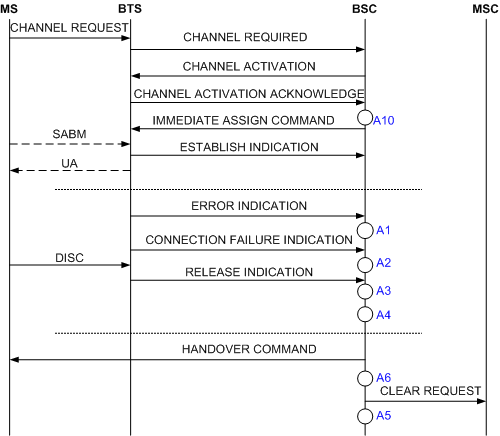
A1: Call Drops Due to ERR IND Received in Stable State, Call Drops Due to the ERR IND Received on the TRX in the Underlaid Subcell in Stable State, Call Drops Due to the ERR IND Received on the TRX in the Overlaid Subcell in Stable State |
A2: Call Drops Due to the CONN FAIL IND Received in Stable State, Call Drops Due to the CONN FAIL IND Received on the TRX in the Underlaid Subcell in Stable State, Call Drops Due to the CONN FAIL IND Received on the TRX in the Overlaid Subcell in Stable State |
A3: Call Drops Due to REL IND Received in Stable State, Call Drops Due to the REL IND Received on the TRX in the Underlaid Subcell in Stable State, Call Drops Due to the REL IND Received on the TRX in the Overlaid Subcell in Stable State |
A4: Call Drops Due to No MRs from MS for a Long Time, Call Drops Due to No MR from the MS on the TRX in the Underlaid Subcell, Call Drops Due to No MR from the MS on the TRX in the Overlaid Subcell, Call Drops due to Abis Terrestrial Link Failure, Call Drops Due to Abis Terrestrial Link Failure on the TRX in the Underlaid Subcell, Call Drops Due to Abis Terrestrial Link Failure on the TRX in the Overlaid Subcell, Call Drops Due to Equipment Failure, Call Drops Due to TRX Failure in the Underlaid Subcell, Call Drops Due to TRX Failure in the Overlaid Subcell, Call Drops due to Resource Check, Call Drops Due to Resource Check on the TRX in the Underlaid Subcell, Call Drops Due to Resource Check on the TRX in the Overlaid Subcell |
A5: Clear Requests Sent on the A Interface |
A6: Call Drops Due to Forced Handover, Call Drops Due to Forced Handover on the TRX in the Underlaid Subcell, Call Drops Due to Forced Handover on the TRX in the Overlaid Subcell |
A10: Successful SDCCH Seizures (Call Type) |
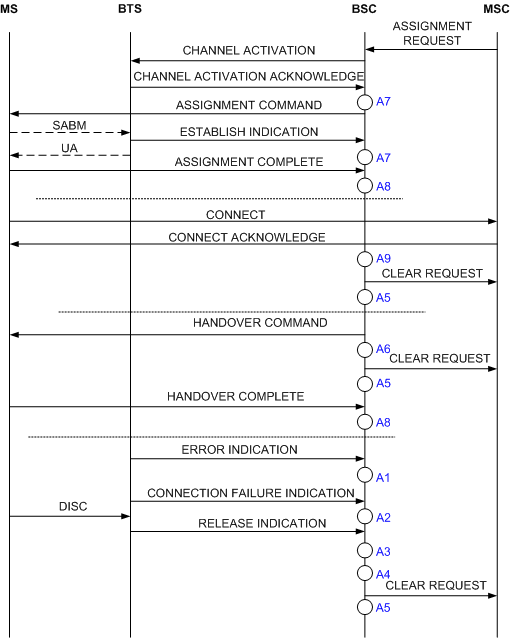
A1: Call Drops Due to ERR IND Received in Stable State, Call Drops Due to the ERR IND Received on the TRX in the Underlaid Subcell in Stable State, Call Drops Due to the ERR IND Received on the TRX in the Overlaid Subcell in Stable State |
A2: Call Drops Due to the CONN FAIL IND Received in Stable State, Call Drops Due to the CONN FAIL IND Received on the TRX in the Underlaid Subcell in Stable State, Call Drops Due to the CONN FAIL IND Received on the TRX in the Overlaid Subcell in Stable State |
A3: Call Drops Due to REL IND Received in Stable State, Call Drops Due to the REL IND Received on the TRX in the Underlaid Subcell in Stable State, Call Drops Due to the REL IND Received on the TRX in the Overlaid Subcell in Stable State |
A4: Call Drops Due to No MRs from MS for a Long Time, Call Drops Due to No MR from the MS on the TRX in the Underlaid Subcell, Call Drops Due to No MR from the MS on the TRX in the Overlaid Subcell, Call Drops due to Abis Terrestrial Link Failure, Call Drops Due to Abis Terrestrial Link Failure on the TRX in the Underlaid Subcell, Call Drops Due to Abis Terrestrial Link Failure on the TRX in the Overlaid Subcell, Call Drops Due to Abis Link Failures in Stable Loopback State, Call Drops Due to Equipment Failure, Call Drops Due to TRX Failure in the Underlaid Subcell, Call Drops Due to TRX Failure in the Overlaid Subcell, Call Drops Due to Resource Check, Call Drops Due to Resource Check on the TRX in the Underlaid Subcell, Call Drops Due to Resource Check on the TRX in the Overlaid Subcell, Call Drops Due to Handover Failure During the Loopback, Call Drops Due to Other Causes in Stable State |
A5: Clear Requests Sent on the A Interface, Call Drops after Answer, Call Drops After Answer on the TRX in the Underlaid Subcell, Call Drops After Answer on the TRX in the Overlaid Subcell |
A6: Call Drops Due to Forced Handover, Call Drops Due to Forced Handover on the TRX in the Underlaid Subcell, Call Drops Due to Forced Handover on the TRX in the Overlaid Subcell, Failed Internal Intra-Cell Handovers (Timer Expired) |
A7: Call Drops Due to Loopback Start Failure |
A8: Successful TCH Seizures on the TRX in the Underlaid Subcell, Successful TCH Seizures on the TRX in the OverLaid Subcell, Call Drops Due to Failures to Return to Normal Call from Loopback |
A9: Successful Connections |
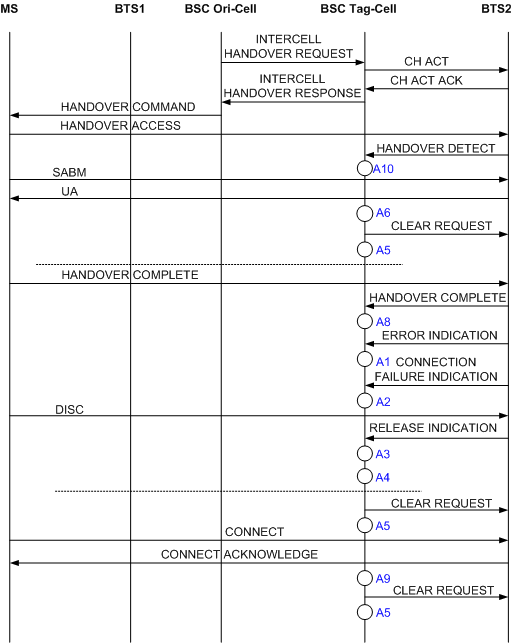
A1: Call Drops Due to ERR IND Received in Stable State, Call Drops Due to the ERR IND Received on the TRX in the Underlaid Subcell in Stable State, Call Drops Due to the ERR IND Received on the TRX in the Overlaid Subcell in Stable State |
A2: Call Drops Due to the CONN FAIL IND Received in Stable State, Call Drops Due to the CONN FAIL IND Received on the TRX in the Underlaid Subcell in Stable State, Call Drops Due to the CONN FAIL IND Received on the TRX in the Overlaid Subcell in Stable State |
A3: Call Drops Due to REL IND Received in Stable State, Call Drops Due to the REL IND Received on the TRX in the Underlaid Subcell in Stable State, Call Drops Due to the REL IND Received on the TRX in the Overlaid Subcell in Stable State |
A4: Call Drops Due to No MRs from MS for a Long Time, Call Drops Due to No MR from the MS on the TRX in the Underlaid Subcell, Call Drops Due to No MR from the MS on the TRX in the Overlaid Subcell, Call Drops due to Abis Terrestrial Link Failure, Call Drops Due to Abis Terrestrial Link Failure on the TRX in the Underlaid Subcell, Call Drops Due to Abis Terrestrial Link Failure on the TRX in the Overlaid Subcell, Call Drops Due to Abis Link Failures in Stable Loopback State, Call Drops Due to Equipment Failure, Call Drops Due to TRX Failure in the Underlaid Subcell, Call Drops Due to TRX Failure in the Overlaid Subcell, Call Drops due to Resource Check, Call Drops Due to Resource Check on the TRX in the Underlaid Subcell, Call Drops Due to Resource Check on the TRX in the Overlaid Subcell, Call Drops due to Other Causes Received in Stable State |
A5: Clear Requests Sent on the A Interface, Call Drops after Answer, Call Drops After Answer on the TRX in the Underlaid Subcell, Call Drops After Answer on the TRX in the Overlaid Subcell |
A6: Call Drops Due to Forced Handover, Call Drops Due to Forced Handover on the TRX in the Underlaid Subcell, Call Drops Due to Forced Handover on the TRX in the Overlaid Subcell, Failed Internal Intra-Cell Handovers (Timer Expired), Failed Outgoing Internal Inter-Cell Handovers (Timer Expired), Call Drops Due to Handover Failure During the Loopback |
A7: Call Drops due to Failures to Return to Normal Call from Loopback |
A8: Successful TCH Seizures on the TRX in the Underlaid Subcell, Successful TCH Seizures on the TRX in the OverLaid Subcell |
A9: Successful Connections |
A10: Successful SDCCH Seizures (Call Type) |
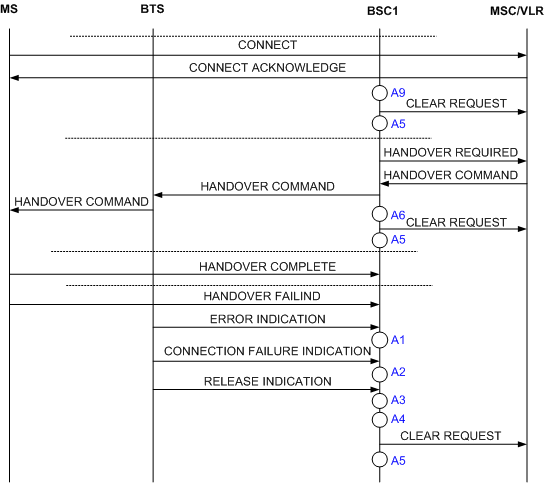
A1: Call Drops Due to ERR IND Received in Stable State, Call Drops Due to the ERR IND Received on the TRX in the Underlaid Subcell in Stable State, Call Drops Due to the ERR IND Received on the TRX in the Overlaid Subcell in Stable State |
A2: Call Drops Due to the CONN FAIL IND Received in Stable State, Call Drops Due to the CONN FAIL IND Received on the TRX in the Underlaid Subcell in Stable State, Call Drops Due to the CONN FAIL IND Received on the TRX in the Overlaid Subcell in Stable State |
A3: Call Drops Due to REL IND Received in Stable State, Call Drops Due to the REL IND Received on the TRX in the Underlaid Subcell in Stable State, Call Drops Due to the REL IND Received on the TRX in the Overlaid Subcell in Stable State |
A4: Call Drops Due to No MRs from MS for a Long Time, Call Drops Due to No MR from the MS on the TRX in the Underlaid Subcell, Call Drops Due to No MR from the MS on the TRX in the Overlaid Subcell, Call Drops due to Abis Terrestrial Link Failure, Call Drops Due to Abis Terrestrial Link Failure on the TRX in the Underlaid Subcell, Call Drops Due to Abis Terrestrial Link Failure on the TRX in the Overlaid Subcell, Call Drops Due to Abis Link Failures in Stable Loopback State, Call Drops Due to Equipment Failure, Call Drops Due to TRX Failure in the Underlaid Subcell, Call Drops Due to TRX Failure in the Overlaid Subcell, Call Drops due to Resource Check, Call Drops Due to Resource Check on the TRX in the Underlaid Subcell, Call Drops Due to Resource Check on the TRX in the Overlaid Subcell, Call Drops due to Other Causes Received in Stable State |
A5: Clear Requests Sent on the A Interface |
A6: Call Drops Due to Forced Handover, Call Drops Due to Forced Handover on the TRX in the Underlaid Subcell, Call Drops Due to Forced Handover on the TRX in the Overlaid Subcell, Failed Outgoing External Inter-Cell Handovers (T8 Expired), Call Drops Due to Handover Failure During the Loopback |
A9: Successful Connections |
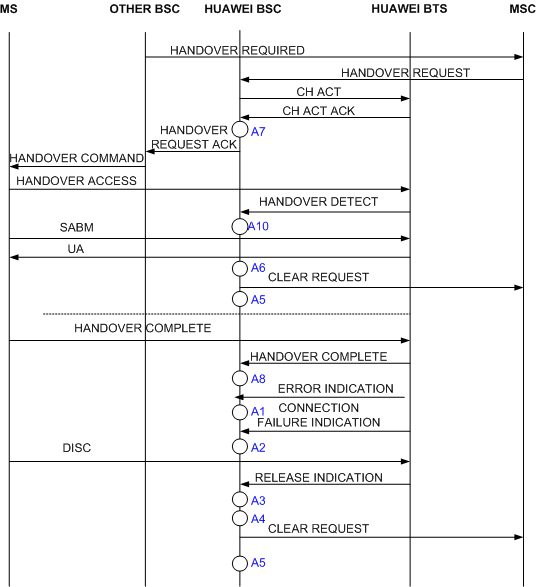
A1: Call Drops Due to ERR IND Received in Stable State, Call Drops Due to the ERR IND Received on the TRX in the Underlaid Subcell in Stable State, Call Drops Due to the ERR IND Received on the TRX in the Overlaid Subcell in Stable State |
A2: Call Drops Due to the CONN FAIL IND Received in Stable State, Call Drops Due to the CONN FAIL IND Received on the TRX in the Underlaid Subcell in Stable State, Call Drops Due to the CONN FAIL IND Received on the TRX in the Overlaid Subcell in Stable State |
A3: Call Drops Due to REL IND Received in Stable State, Call Drops Due to the REL IND Received on the TRX in the Underlaid Subcell in Stable State, Call Drops Due to the REL IND Received on the TRX in the Overlaid Subcell in Stable State |
A4: Call Drops Due to No MRs from MS for a Long Time, Call Drops Due to No MR from the MS on the TRX in the Underlaid Subcell, Call Drops Due to No MR from the MS on the TRX in the Overlaid Subcell, Call Drops due to Abis Terrestrial Link Failure, Call Drops Due to Abis Terrestrial Link Failure on the TRX in the Underlaid Subcell, Call Drops Due to Abis Terrestrial Link Failure on the TRX in the Overlaid Subcell, Call Drops Due to Abis Link Failures in Stable Loopback State, Call Drops Due to Equipment Failure, Call Drops Due to TRX Failure in the Underlaid Subcell, Call Drops Due to TRX Failure in the Overlaid Subcell, Call Drops due to Resource Check, Call Drops Due to Resource Check on the TRX in the Underlaid Subcell, Call Drops Due to Resource Check on the TRX in the Overlaid Subcell, Call Drops due to Other Causes Received in Stable State |
A5: Clear Requests Sent on the A Interface |
A6: Call Drops Due to Forced Handover, Call Drops Due to Forced Handover on the TRX in the Underlaid Subcell, Call Drops Due to Forced Handover on the TRX in the Overlaid Subcell, Failed incoming external inter-cell handovers (Timer expired), Call Drops Due to Handover Failure During the Loopback |
A7: Call Drops due to Failures to Return to Normal Call from Loopback |
A8: Successful TCH Seizures on the TRX in the Underlaid Subcell, Successful TCH Seizures on the TRX in the OverLaid Subcell |
A9: Successful Connections |
A10: Successful SDCCH Seizures (Call Type) |
Formula
This is an original counter without involving any formula.